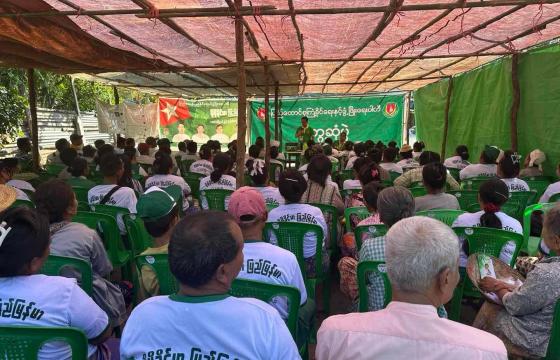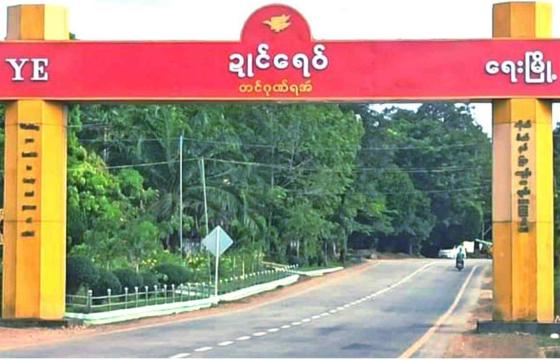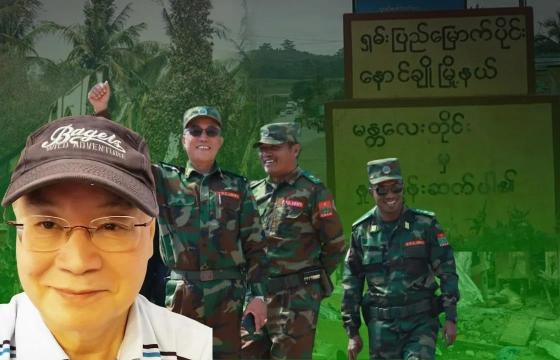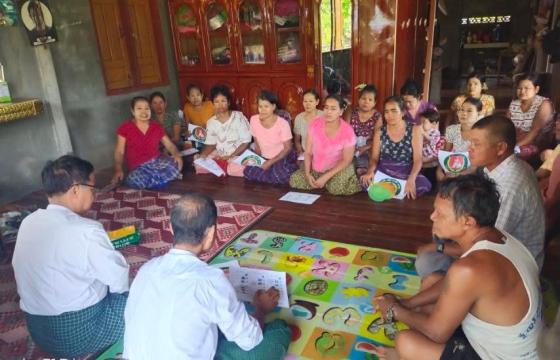Reported by: Interviewer: Nai Banyar Aung
On behalf of Mon News Agency, I would like to congratulate you for having been elected to become the New Mon State Party (NMSP) chairman at the recent eleventh NMSP central conference held in the early 2020.
Question: First of all, I would like to ask regarding the peace process, which has been stalled for a year and a half. It is believed that the recent 8th JICM meeting would bring a good outcome, so what are the positives results for the peace process?
Answer: Since mid 2018, after the third meeting of the 21st Century Panglong, we have been unable to move forward with the peace process. However, we have seen the desire of the government to pursue peace. We, the ethnic armed forces, also have a will to achieve peace, and we have put a lot of effort into this project.
However, there was no outcome even after the ten top leaders from both sides attempted to find solutions. Both sides were able to resume talks by the end of 2019, and the fourth meeting of Panglong conference is expected to be held in the first quarter of 2020. Both the government and NCA-S EAO (Ethnic Armed Organizations) have been longing to hold the peace conference.
They (the government) and we both clearly understand that resolving our issues through armed will never end the obstacles. Therefore, both sides are dedicated to restarting the peace process.
According to our sister, Aung San Suu Kyi’s speech at the 4th anniversary of the Nationwide Ceasefire Agreement (NCA) signing ceremony hold on October 28th in 2019, there are good signs for peace process. I want to share some quotations from her speech According to her speech, “our NLD government has been committed to establishing the Federal Union of Democracy since the beginning of our national responsibility.”
“We have always been emphasizing that we can only achieve sustainable peace if the genuine federal [union] can be established. There must be a shared decentralization of power in line with the federal system. There must be a shared resource allocation and taxation. The whole federal unit must be equal. The states must have their constitution that guarantees their autonomy.”
Daw Aung San Suu Kyi has made a good point regarding the advantages of a federal union, which I had never heard before. Both the government and Tatmadaw previously have been quiet and mentioned nothing. She has come to realize that peace will not be able to be achieved without pursuing this path, she brought up this statement, and it helps to bring ethnic people and the government together in terms of point of view.
There are more quotes in her [Daw Aung San Suu Kyi) speech. “We cannot witness peace in the country unless we build a federal union based on ethnic equality.”
“Our country can’t develop unless we can build ethnic unity with the Pang-long spirit. We have been experiencing this situation for over 70 years. Nothing is impossible if all of us worked hard together to change the situation.”
The statement by Daw Aung San Suu Kyi, who serves as the top leader of the current Myanmar government is in line with our ethnic peoples’ views and it is opening up an opportunity. However, we cannot exactly say how the upcoming peace talks will take shape.
We are uncertain of the Tatmadaw’s perspective.
The government and Hluttaw [Parliament] have the same view with us, and I think it is a good potential for peace.
The Gambia lawsuit against Myanmar at the International Court of Justice (ICJ), pointed out that we [Myanmar] have violated international norms. As a result, international pressure could likely impact the current situation. The top government and Tatmadaw leaders have a better understanding of this. Regarding the decision, I believe there will be a change in the government and Tatmadaw’s mindset, more or less.
Reviewing the two points, it seems that the potential is promising. In the coming days, the representative of the government and our NCA-S EAO will again hold talks. The fourth meeting Panglang is scheduled to be held in April.
However, the outcome of the peace conference is not something we can verify. Also, we cannot predict what difficulties we may encounter during the discussion. There may be some difficulties. However, we are hopeful and looking forward to good results from the conference.
Question: Will it be possible to hold the 21st-century Panglong conference without having Shan and Rakhine to hold national-level political dialogues?
Answer: According to the informal discussion, the Shan and Rakhine will be allowed to hold political talks. We have heard that the government and the Tatmadaw are in a position to accept that, and it is also a promising opportunity.
Right, these are positive developments to consider. On the other hand, the NLD is preparing for a constitutional amendment in the 21st Panglong, and so is the 45 committee members led by the NLD in the Hluttaw. Are these two initiatives competing? Can’t it be complicated?
Constitutional amendments will not be easy to get through parliament. It cannot be amended if the Tatmadaw does not accept it. Because the 2008 Constitution cannot be easily amended in parliament, is why we are moving along the path of the peace conference.
If it is decided by conference, it must then be approved by the Parliament. Attempting a constitutional amendment through 21st Panglong conference is the most convenient path.
Moreover, the NLD has given its promise to the public during the election that it will amend the Constitution, but nothing has been done yet. On the other hand, the 21st Century Panglong Conference has been suspended so that the parliament has to try to advance the amendment in this way.
The government may try to symbolically present their promise given in the election, but I don’t think it is effective enough. It seems that the Constitution cannot be amended if the Tatmadaw continues to defend it.
Another possibility is that the NLD is showing its willingness to amend the constitution. We are unsure whether it is going to be a success or a failure, but it is another story.
However, the simplest way to solve this issue is to revise the Constitution in the 21st Century Panglong conference as there will be no objection from Tatmadaw representatives, which covers 25% votes, and everyone must agree upon the decision.
To conclude, the NLD is not trying to amend the Constitution in competition with the Panglong, rather they are attempting to organize a pathway at the 21st Century Panglong Conference, which up until now had been halted.
Question: In the current peace process, both the government and armed groups, including the Tatmadaw, are active. What would you recommend to civil society organizations (CSO)s and the public as to how they can take part in the peace process?
Answer: The ethnic armed revolutionary forces and the government, including the Tatmadaw, are significant players in the civil war in our country. If these two forces could gain mutual understanding, everything will be peaceful and stable. Peace and reformation in our country are dependent on these two forces. They have had informal discussions, and the remaining forces will be also attracted to join if these two forces could build a good relationship.
Question: Are there any plans for the seven Northern Allies to be involved in the peace process? What is the latest situation regarding this?
As far as we know, Kachin Independence Organisation (KIO), the Arakan Army (AA), their military alliance along with the Ta’ang National Liberation Army (TNLA) and the Myanmar National Democratic Alliance Army (MNDAA) have had informal discussions with the government. The ceasefire will be resolved through these discussions, and those groups will be included in the peace process.
On the other hand, the Kachine refugee issue has been around for quite some time. They are eager to gain peace and are willing to bring their conversation to the discussion table.
The conflict in Rakhine state is intensifying day-by-day. Many people also have been suffering from the war. There have been many internal displaced persons (IDP). In the Rakhine conflict, it seems that the government and AA fighting is attempting to eliminate each other for the long term, but it is not easy in practice.
Recently, the government forces are suffering a lot. It is clear the problem cannot be resolved by fighting each other. Therefore, they are attempting to solve this issue by meeting and discussing. However, the Northern Allies still do not accept the NCA as it contains some significant unacceptable points.
The Northern groups are attempting to hold the ceasefire talks before signing the NCA so that they will be able to join the political dialogue. It is good if the plan is possible.
Question: Before the fourth meeting of the 21st Century Panglong Conference, it has been reported that another ethnic conference will be held; What kind of conference will this be?
Answer: It is not yet possible to say that an ethnic conference will be held. The task force team that includes ethnicity from the seven states has been aiming to hold such a conference for the last two years. We have been drafting our own Constitution based on the federal union system that has been agreed to by the ethnic armed groups as well as ethnic political parties.
We believe that it will be easier to have a discussion with the government when we have a clear view. The draft is also finished. We are expecting to call a conference after top senior leaders have approved this draft Constitution.
This means that if any ethnic group or representative is committed to this principle, it will be more effective to ask for a federal union. If we have different perspectives and views, it may not work when talking to either the government or the Tatmadaw. Therefore, we are attempting to gain a federated view of all ethnic people.
Question: If there is anything I have not yet asked or anything you would like to add regarding the peace process?
Answer: The biggest challenge in the current peace issue is the Tatmadaw’s point of view. At the 4th Anniversary of NCA signing ceremony, Commander-in-Chief of Defense Services Senior General Min Aung Hlaing noted the Tatmadaw stands by their six-principles for peace.
It is the biggest challenge for our ethnic groups. There is no change in their perspective. If the Tatmadaw resist negotiations on these six points, there will still be some obstructions.
There has been a discussion about these divisions. We have always thought of ways for both the Tatmadaw and our ethnic armed groups to have each own guarantees and live together in this union. I often talk about this to them. Only if we all are united, will we be secure.
According to the country’s geography, only the Mon and Rakhine States (and the Tanintharyi Region) have coastal borders while the rest of the ethnic groups reside in the mountains and inland areas.
The ethnic minorities will face great challenges when they leave the Union. It is impossible to be completely isolated. Therefore, no one will be separated since the NCA agreement provides equal rights and democratic benefits and self-autonomy rights to each national.
Thank you!
<><><>
Photo – Interviewed with Nai Hongsa (MNA)







